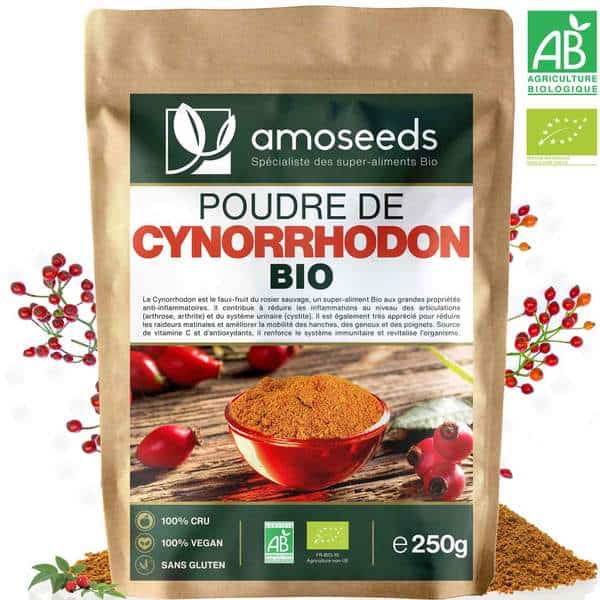BENEFITS OF ROSEHIP
✓ Strengthens and stimulates the immune system
✓ Reduces inflammation
✓ Fat-burning
✓ Protects and improves skin beauty
✓ Potentially anti-cancer
What is rosehip?
The rosehip (also sometimes written “cynorhodon”) is the fruit of the dog rose, also called the “wild rose” (Rosa canina) and a member of the Rosaceae family. It is a common shrub in our regions, found throughout Europe, in North Africa and even in Western Asia. It can reach 3 m in height and has many thorns. But the dog rose is above all known for its edible red berries, the rosehips, commonly nicknamed “poil à gratter” in reference to their stinging hairs.
In botany, rose hips are considered false fruits, just like bilberries, cranberries and strawberries. Thus, they do not result from the fertilization of the flower’s pistil alone but from other parts. Initially orange, rose hips turn red in autumn. They are fleshy, oval berries about 2 cm long that can be harvested throughout the winter and are much appreciated by birds.

Rose hips have a long history behind them. Consumed since prehistoric times, they were made into juices and used for tea, jellies and jams. Appreciated for their mild, naturally sweet taste, these fruits were also known for their medicinal properties.
Thus, they were recommended to prevent and treat the common cold, used as diuretics and for the treatment of various inflammatory diseases. These health benefits were later confirmed by modern medicine and scientific research.
Today, rose hips are known to be fruits very high in vitamin C, which gives them antioxidant and stimulating properties.
They are also recognized for anti-inflammatory and anti-obesity properties and benefits for the skin. Finally, recent studies have highlighted the potential of rose hips to fight certain cancers.
Nutritional composition
- Amino acids including the 8 essential ones
- Vitamins : provitamin A, B1, B2, B3, C, K, E
- Minerals and trace elements : calcium, phosphorus, potassium, magnesium, sulfur, zinc, iron, manganese, sodium
- Sugars : sucrose, fructose
- Fibers
- Proteins
- Tannins
- Antioxidant actives : polyphenols, flavonoids, carotenoids, saponins
- Natural acids : malic acid, citric acid, pectic acid
- Fatty acids : omega-3, omega-6
- Essential oils
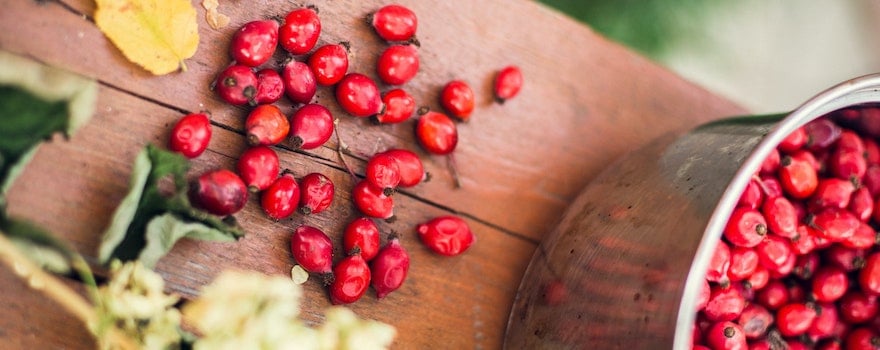
Buy organic rosehip: our pick
I recommend the organic rose hip powder from the amoseeds brand.
We recommend (and consume!) amoseeds’ superfoods because its founders source directly from local organic cooperatives.
They therefore offer very high-quality products at a lower cost, and customer feedback is excellent (see reviews here).
Remember to use the promo code “DARWIN” when placing your order to get 5% off all their products.
❤ What I like : Very good value for money, organic certification and positive customer reviews.
★ Customer reviews : 4.9/5
☞ Quantity: 250 g / 50 servings
✔ Promo code -5% : DARWIN
The benefits of rosehip
🛡 Strengthens and stimulates the immune system
Rosehip contains an exceptional amount of vitamin C or ascorbic acid : between 300 and 1300 mg per 100 g. Thus, it far exceeds citrus fruits like the orange or other berries such as goji berries. This vitamin C is mainly concentrated in the flesh of the fruit.
Thanks to this composition, it is ideal for strengthening defenses and stimulating the immune system, especially as winter approaches. Its vitamin C helps prevent and fight common ailments (colds, flu, temporary fatigue…) and infections. It also exerts antioxidant effects against free radicals that weaken the body.
Finally, rosehip contains other interesting compounds to strengthen and stimulate the immune system. It notably contains polyphenols, such as flavonoids, but also carotenoids and saponins. These antioxidant substances are powerful protective agents against the development of diseases.
This study from Alexandru Ioan Cuza University of Iași (Romania), carried out on fruit samples, shows the vitamin C content of rosehip according to altitude.
🔥 Reduces inflammation
Consuming rosehip is beneficial for reducing inflammation, particularly in cases of arthritis, osteoarthritis or rheumatoid arthritis. In addition to acting on the inflammatory process, it also helps relieve associated pain and improve joint health.
Like cocoa, rosehip contains flavonoids and tannins that act on inflammation and calm the inflammatory response. It also contains vitamins that help regulate the process and reduce joint pain such as vitamin E and B3. Finally, certain minerals and trace elements (potassium, magnesium, manganese…), fight inflammation and support joint health.
It relieves many symptoms such as morning stiffness or loss of mobility in the hips, knees, and wrists.
This study from RMIT University (Australia), conducted on patients with arthritis, shows the effectiveness of rosehip in reducing pain.
Another study from the Charité University Medical Center (Germany), conducted on patients with rheumatoid arthritis, also demonstrates its effectiveness in improving symptoms.
🏃🏻♂️ Fat-burning
Rosehip is also useful for fighting obesity. Consuming it can help lose weight healthily and reduce body fat, particularly in the abdominal area.
On one hand, rosehip acts on the peroxisome proliferator-activated receptor (PPAR). This protein is involved in metabolism and adipogenesis (formation of fat cells in adipose tissue). It thus limits fat storage in the body.
On the other hand, rosehip improves symptoms associated with obesity. It reduces, for example, systolic blood pressure and cholesterol levels. It also prevents common complications in obese people such as cardiovascular disease and type 2 diabetes.
This study from the Research and Development Division of Osaka (Japan), conducted on pre-obese patients, shows how consuming rosehip reduces body fat.
This other study, conducted by the same researchers in mice, shows how rosehip inhibits the accumulation of lipids in adipose tissue.
🍑 Protects and improves skin beauty
Rosehip is less known for its benefits to the skin. Yet, there are many of them! It especially helps to prevent premature skin aging, reduce wrinkles, improve elasticity, and maintain the skin’s hydration level.
Thanks to its high content of vitamin C, carotenoids, polyphenols and various flavonoids, it exerts a powerful antioxidant effect. It thus fights free radicals that cause oxidative stress in the skin and accelerate aging.
It also contains valuable fatty acids beneficial for the skin. Linoleic acid, for example, provides suppleness and elasticity. Oleic acid, meanwhile, strengthens the hydrolipidic film and helps maintain hydration.
Finally, rosehip is an excellent source of vitamins, minerals and trace elements good for the skin : provitamin A, vitamins C and E, zinc, manganese, magnesium…
This study from Mae Fah University (Thailand), conducted on subjects aged 35 to 65, shows the skin benefits of a rosehip cream.
🔬 Potentially anti-cancer
Recent studies have highlighted the anti-cancer potential of rosehip. Indeed, it appears to reduce the proliferation of cancer cells and inhibit the action of protein kinase B (AKT), which promotes their survival in the body.
It owes this property to the vitamin C and antioxidant polyphenols it contains. These exert an antiproliferative effect on diseased cells and are capable of inducing apoptosis (programmed cell death). Rosehip has been shown to be particularly effective against colon cancer and breast cancer.
This study from the Public University of Navarre (Spain), conducted on cancer cells, demonstrates the beneficial effects of rosehip on colon cancer.
This other study from North Carolina Agricultural and Technical State University (United States), conducted on breast cancer cell lines, demonstrates a significant reduction in their proliferation thanks to rosehip.
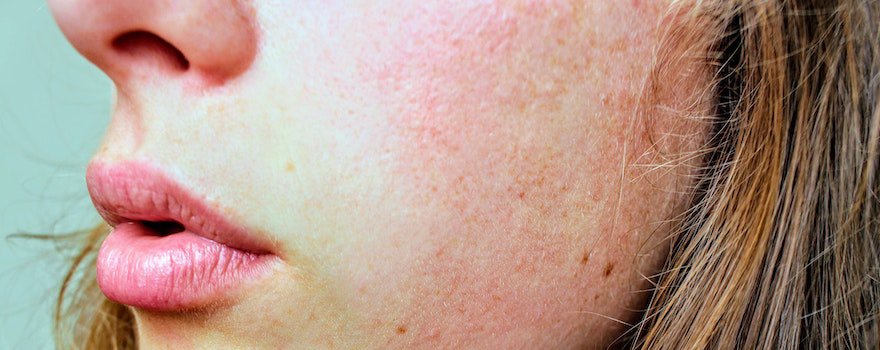
How to consume rosehip?
Rosehip berries
Rosehips have a slightly tart taste. They are harvested from September and throughout the winter. They can be eaten as is when they are fully ripe and red. The first frosts will make them softer. But before consuming them, it is necessary to cut them in half and wash them thoroughly to remove the irritating hairs trapped inside.
Fresh or dried berries can also be prepared as a syrup, as a decoction, as herbal tea or an infusion. Use 3 g of rosehips for 200 ml of water.
Finally, you can extract the pulp and pass it through a mill or a blender. You can add your rosehip preparation to soups, creams, sauces…
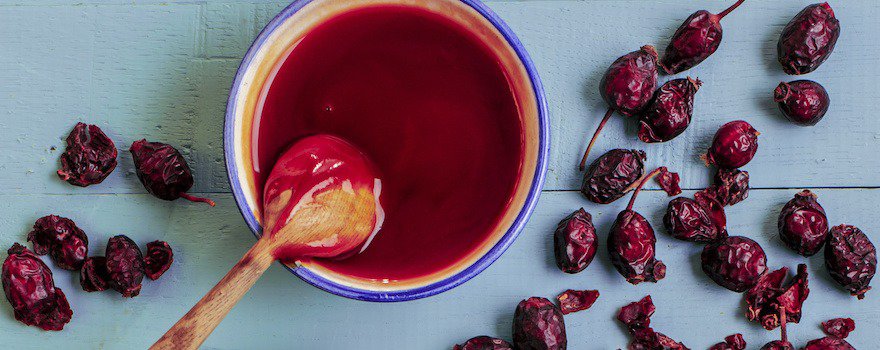
Rosehip tablets
Rosehip is also available in tablets and capsules. They then contain powdered dried berries that have been crushed. It is a dietary supplement that is easy to find, convenient and tasteless (although the flavor of the berries is not unpleasant).
To obtain satisfactory results, choose capsules with a sufficient dosage of rosehip (minimum 300 mg per capsule). Also opt for capsules without additives and that are vegetarian.
Rosehip powder
Rosehip powder is obtained by pressing the dried berries. It is a fairly natural, minimally processed form that has preserved the various nutrients present in rosehip.
The powder is ideal for preparing fruit juices, smoothies, milkshakes, soups… It can also be added to yogurt or muesli or used for making homemade jellies and jams . Choose a rosehip powder obtained by cold pressing, 100 % pure, with no additives, no preservatives or GMOs.
Rosehip mother tincture
The rosehip mother tincture is obtained by cold percolation or by macerating the fruits in an alcohol/water mixture. It is a form rich in active compounds but contains a lot of alcohol. Therefore, the rosehip mother tincture is not recommended for pregnant women, children, or people suffering from certain medical conditions.
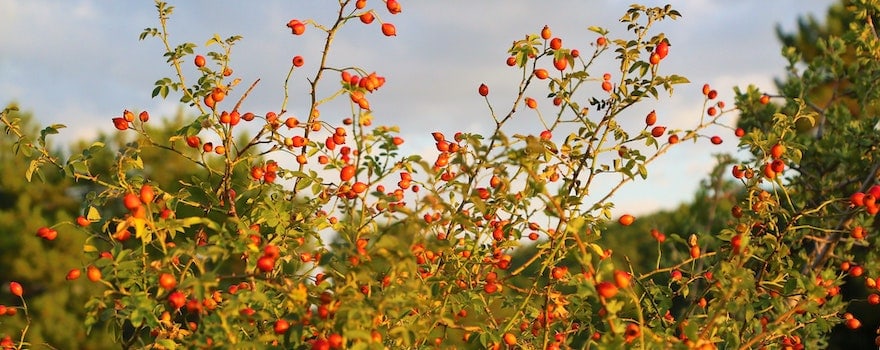
Rosehip and medicinal plants
To stimulate and strengthen the body, rosehip can be combined with acerola or camu camu.
To support weight loss, you can combine rosehip with other superfoods such as Brazil nuts or griffonia, an appetite regulator.
Finally, the rosehip/turmeric combination is ideal for reducing inflammation, relieving arthritis, osteoarthritis and joint pain.
Consume sustainably: favor local, organic, and fair-trade rosehip
✓ Rosehips are fruits that are easy to harvest in the wild from autumn onwards. They are often found in hedgerows, woods, thickets and scrub. If you can, favor wild harvests that are sparing and respectful.
✓ Unfortunately, rosehip is becoming increasingly rare due to the destruction of hedgerows and wild habitats. To meet growing demand, more and more rosehips therefore come from cultivated plants. Preferably choose berries originating from France and certified organic. It is also possible to find rosehip from fair trade and solidarity-based supply chains.
Dosage
It is recommended not to consume more than 5 g of rosehip per day.
The capsules are taken with a large glass of water and before meals.
Intakes should be carried out for at least 3 months to obtain satisfactory results.
- Rosehip berries : 5 g per day
- Rosehip tablets : 3 to 6 capsules per day for 300 mg capsules
- Rosehip powder : 2 to 5 g per day
- Rosehip mother tincture : 15 drops morning and evening
Contraindications and side effects
Consumption of rosehip presents certain contraindications :
- As a precaution, rosehip is not recommended for pregnant and breastfeeding women and for young children ;
- Diabetics, people suffering from a blood clotting disorder, kidney stones, an iron deficiency or excess should avoid consuming it ;
- Because of its high vitamin C content, it is not recommended for people suffering from a G6PD deficiency or favism ;
- People with a history of heart conditions or prone to blood clots should also avoid consuming rosehip ;
- Rosehip may have interactions with certain medications such as aspirin, anticoagulants and estrogens.
Excessive consumption of rosehip may cause the adverse effects listed below :
- Intestinal pain
- Stomach cramps
- Nausea and vomiting
- Diarrhea or constipation
- Headaches
- Sleep disturbances
If you experience side effects, stop taking it and consult a doctor.
History, cultivation, and market of rosehip
The fruits of the dog rose have long been part of local French customs. In Lozère, for example, rosehips are used to prepare the famous « gratte-cul » jam. They are also the subject of many folk tales and popular legends.
But the use of rosehip extends well beyond France’s borders. Rosehips are also consumed in Sweden, Armenia, Chechnya and the Netherlands, as soup, tea, juice or jam.
The consumption of rosehips is not new. Indigenous peoples, the Iñupiat of Alaska and the Tanaina Indians had already discovered their taste and nutritional qualities long before us. Today, like many wild fruits, rosehip is back in the spotlight… and it’s well deserved !
Report produced by Julia Perez and Charlotte Jean
Sources and scientific studies
Ioana Roman, Andreea Stănilă, Sorin Stănilă. Bioactive compounds and antioxidant activity of Rosa canina L. biotypes from spontaneous flora of Transylvania.
Lăcrămioara OPRICA, Cristina BUCSA, Maria Magdalena ZAMFIRACHE, 2015. Ascorbic Acid Content of Rose Hip Fruit Depending on Altitude.
Marc Cohen, 2012. Rosehip – an evidence based herbal medicine for inflammation and arthritis.
S N Willich, K Rossnagel, S Roll, A Wagner, O Mune, J Erlendson, A Kharazmi, H Sörensen, K Winther, 2010. Rose hip herbal remedy in patients with rheumatoid arthritis – a randomised controlled trial.
Akifumi Nagatomo, Norihisa Nishida, Ikuo Fukuhara, Akira Noro, Yoshimichi Kozai, Hisao Sato, and Yoichi Matsuura, 2015. Daily intake of rosehip extract decreases abdominal visceral fat in preobese subjects: a randomized, double-blind, placebo-controlled clinical trial.
Akifumi Nagatomo, Norihisa Nishida, Yoichi Matsuura, and Nobuhito Shibata, 2013. Rosehip Extract Inhibits Lipid Accumulation in White Adipose Tissue by Suppressing the Expression of Peroxisome Proliferator-activated Receptor Gamma.
L Phetcharat, K Wongsuphasawat, et K Winther, 2015. The effectiveness of a standardized rose hip powder, containing seeds and shells of Rosa canina, on cell longevity, skin wrinkles, moisture, and elasticity.
Sandra Jiménez, Sonia Gascón, Asunción Luquin, Mariano Laguna, Carmen Ancin-Azpilicueta, and María Jesús Rodríguez-Yoldi, 2016. Rosa canina Extracts Have Antiproliferative and Antioxidant Effects on Caco-2 Human Colon Cancer.
Patrice Cagle, Tonisha Coburn, Patrick M Martin, 2014. Rosehip (Rosa canina) extracts prevent MAPK and AKT-mediated cell proliferation in African American triple-negative breast cancer cells.



